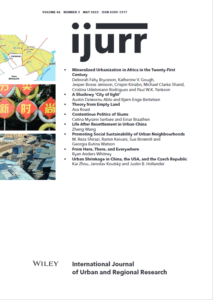Resettlement thus far has been conceptualized as a large-scale form of displacement taking place within a short timeframe. In this article I attempt to reinterpret resettlement as a two-stage process involving both the deterritorialization and reterritorialization of residents by shedding light on the processes and challenges involved in rebuilding the sense of community of residents after resettlement. I draw on the case of a relocation settlement in Shanghai and find that the Chinese state is heavily involved in reterritorializing residents because it needs to consolidate its influence at the grassroots level and address the practical necessity of assisting tens of millions of resettled residents who lack access to essential amenities and services. The state uses a mechanism I describe as state-led community building in its attempt to rebuild the sense of community of resettled residents in a way that also renders residents more governable. In practice, this involves increasing the number and power of resettlement committees and promoting resident volunteering and participation through community organizations and events. State-led community building works relatively well in the case of retired urban residents, but fails to attract other resident groups, including rural and working migrant residents.

